Another Timbre TimHarrisonbre
Interview with Oliver Leith
Tell us about your background and how you came to experimental music.
Recently I’ve thought about experimental music differently. Right now a lot of people are getting angry at boring statues being decapitated and drowned. Why are we so reverent to old things? I’ve never considered myself a classical musician, or part of that world and although I’m very pleased and enjoy that those groups and those places support my music, it doesn’t feel like my culture. Maybe everyone feels that way. That being said, I also never set out to make experimental music. I liked the orchestral instruments, I can't perform and I couldn't write good grand sparkly orchestral music. I think that I write wrongly and I’m more comfortable drinking with people who don’t mind that.
What were your earliest encounters with music growing up, and did you study it at university?
I played guitar in bands as a teenager, also a little classical. My secondary school was awful for everything else but had this strangely brilliant music department run by serious musicians, mostly jazz people, no strings at the school. Music was my favourite thing but after a while I didn’t want to play anymore. I heard the version of Prayer (oh doctor Jesus) by Miles Davis and Gil Evans which has this amazing lion roar brass bit which I found as meaty as Nirvana and that stuff - so I started to try and steal that, getting my mates to multitrack and record bits and make a big fake band. After a bit more of that, I wrote a piece for ten glockenspiels and when I heard it live I thought wow this is a great feeling, really good. I then studied composition at Guildhall for a long long time, had a lovely time there, met good friends, had nice teachers. A visiting string quartet once said about a piece of mine ‘this just sounds like rock music’, emphasis on the just. I don’t think that is true but is a funny arc.
So if your music isn’t rock, but also doesn’t fit into the classical music world, how do you describe or situate it?
Well I wouldn’t mind if it was rock at all - that’s their sniffs. I don’t think it is one thing. I guess part of the reason I use classical instruments, other than enjoying the sound, is because I can’t perform and they are very used to the idea of someone notating ideas - so - if I could be given a death metal band or something to work with that I could write instructions for, just like an ensemble, that’d be just grand, I’d write blood bath flogging or something.
This piece (‘good day bad day…’) is what I sound like with those instruments and with George and Siwan in mind. I sometimes make electronic music which is very different but I think you could tell it’s made by the same person, maybe. It’s like visual artists who make short art films, if they are given the chance to make a feature film, some might expect it to be a longer version of their usual but a feature is a different format, why would they not want to try the big budget magic. You can look at an artist like Steve McQueen, where you can move between the wonderful rolling oil drum to a two-hour widow heist film. It is all him, just for different forces. I think that’s great.
So moving on to 'good day good day bad day bad day', what does the title refer to?
I like looking at and framing everyday life, sometimes banal things. Good day good day bad day bad day is almost an incantation, I was interested in the rituals, habits, things we tell ourselves to keep going, invasive irrational thoughts, odd pleasures and reliefs of life. Mainly because I realised when chatting to mates that these sometimes debilitating thoughts, anxieties and compulsions are just normal, common. The piece isn’t biographical or about them, but is sort of fed by these ideas, a tender look at the violent, loving, contradictory, stupid, repetitive, frightening, comforting thoughts that dictate a good day or a bad day. It seemed a nice musical thing too, specific, fiddly, nervous, pressured, repetitive - I don’t know how musicians do it. When it was first performed I wanted it to look like it was in George and Siwan's living room, weird in St John Smith’s Square but it seemed an extension of the piece - a private thing, a home space, some mugs, a rug, maybe a lamp in the middle of a concert hall. I was very happy after the concert, had some drinks with friendly faces.
Is ’good day good day bad day bad day’ similar to your other recent pieces, and have you written other pieces that are as long?
It is my longest piece for sure, my acoustic pieces are usually written with the people in mind, perhaps more than the instruments. I’ve started to think of it like writing for bands - or like producing for bands - players have something more than ensemble, personalities, even how they present themselves off stage - CD covers, posters and all that - everything goes into the pieces - like characters. So - my pieces can sound very different - the only seemingly unshakeable constant is that they always sound a little sad. I can’t help that, I have tried.
I’d seen Siwan and George do long performances of things like Feldman and, as we became better friends, something emerged - something very particular, sensitive and lovely about them as people and musicians - this idea about privateness, tenderness etc seemed to already be their piece. Hopefully one day I will do them a bigger piece.
Yes, that sense of tenderness certainly comes across, through the unorthodox weirdness of the soundworld. The piece divides clearly into different sections, but I guess that you were composing intuitively rather than having an underlying structure or programme determining the music…?
It was a mainly intuitive bit of work, I’d say. Structure and things like that are more to me like positioning things on a shelf, done by eye and shuffling - oh that little plastic apple works besides that ash tray which only sits right beside the mirror. I worked on some sounds with George and Siwan, stole some of their ideas - got together the broad brushstroke material and instruments and then I played on the floor of my studio for a long time. This was a much more hands on process than usual, more tactile. George leant me the waterphone and I ripped my fingers to shreds trying to make it not sound like horror soundtracking - now he has to rip his hands doing it, which I’m sorry about. Some of the sampler instruments, like the orchestra warming up sound, have a vaguely extra musical beginning, not high concept, but I always think when I see musicians about to perform that it’s like standing at the edge of a cliff, queasy or something - apparently it’s not always like that but it would be for me. It also makes a great sound.
at161 Oliver Leith ‘good day good day bad day bad day’ (2018)
A 45-minute piece for keyboards and percussion, played by the GBSR duo:
George Barton - percussion and Siwan Rhys - piano & keyboards
Recorded in London, March 2020
“At the premiere I remember thinking the opening was one of the most dreamy things I’d heard in ages. But I’d forgotten just how many more sweetly sad worlds the rest of the work carries us to. New music does not get more lovable than ‘good day good day bad day bad day’. It’s a piece you want to hug. A sweet-hearted hypnagogic gem from one of the young masters of the sadboi school.”
Igor Toronyi-Lalic
NB CD copies are now sold, but downloads can be bouht from our Bandcamp page here
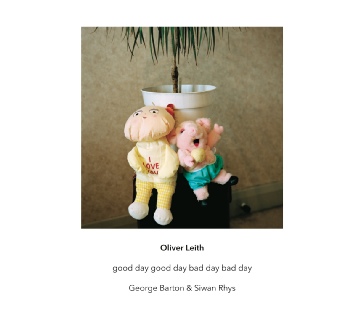
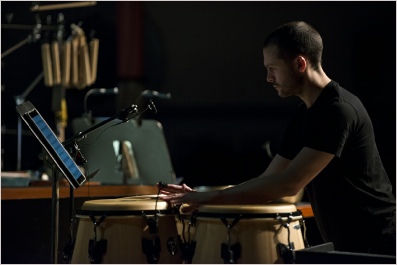
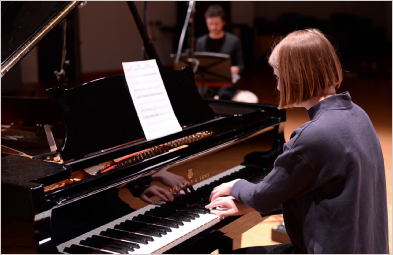
Siwan Rhys, photo Dejan Mrdja
George Barton, photo John Bonner
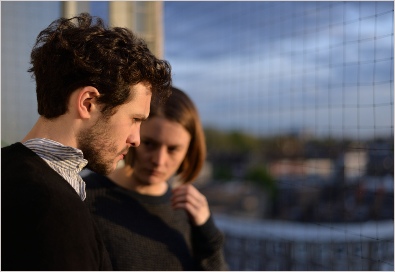
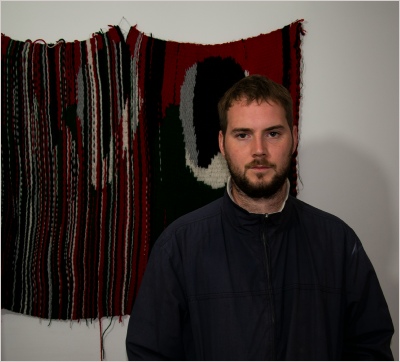
Oliver Leith
George Barton & Siwan Rhys Photo by Dejan Mrdja